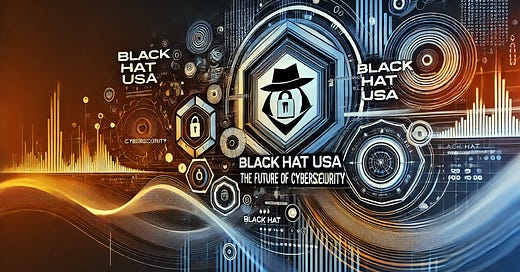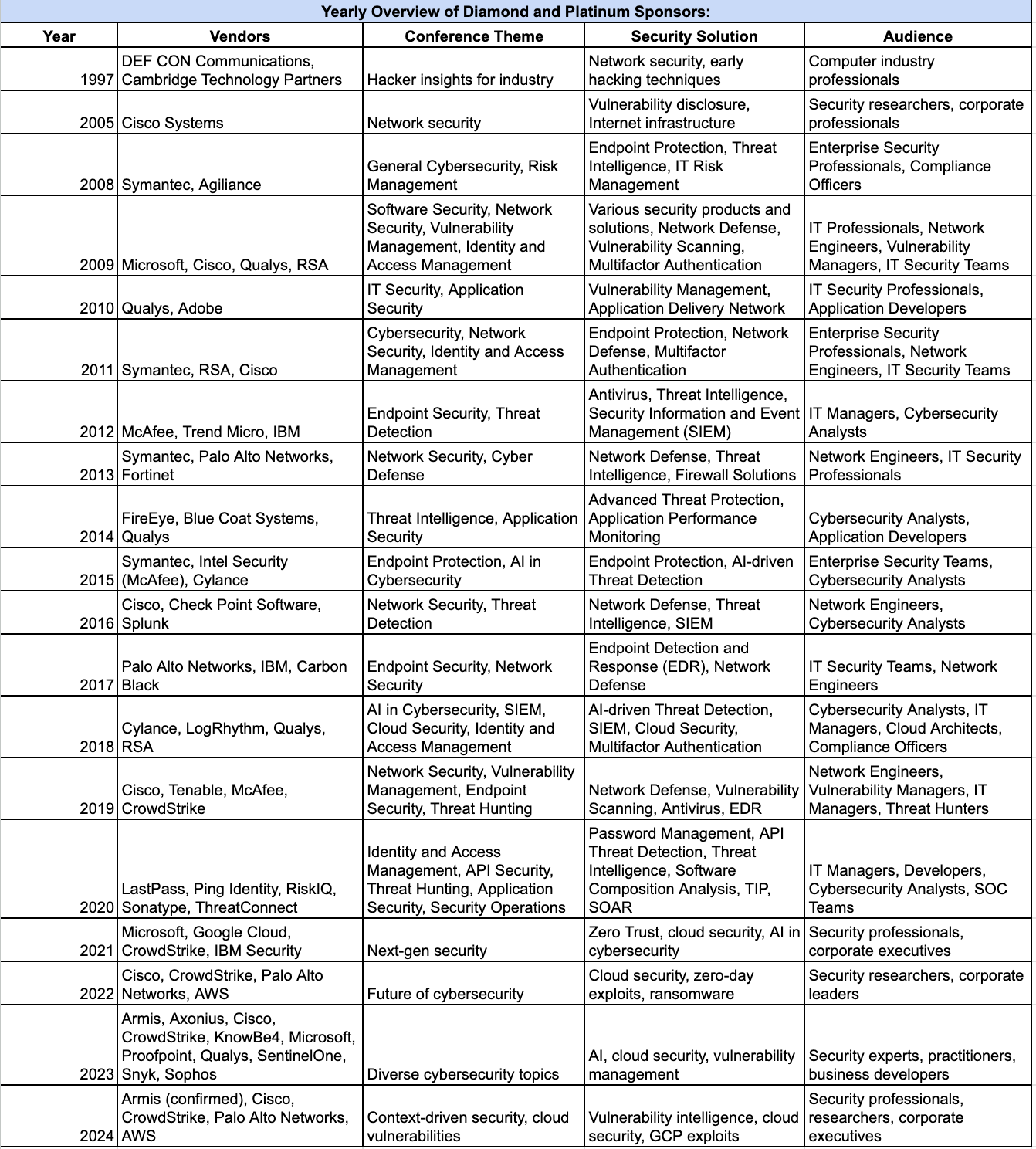Loudest Voice in the Room: How BlackHat Sponsors Shape Cybersecurity’s Future
Why it matters: Understanding Black Hat's focus helps predict emerging cybersecurity priorities, keeping you ahead of threats.
Details:
History: Black Hat has evolved from a niche event in 1997 to a global conference, reflecting the dynamic cybersecurity landscape.
Sponsor Evolution: Early sponsors focused on hacking and network security. Recent sponsors, including Microsoft and AWS, highlight cloud security, AI, and Zero Trust architectures.
Audience: Initially for hackers and tech professionals, the event now attracts government agencies, corporate executives, and business developers.
Trends and Analysis:
Sponsor Evolution: Transition from niche tech firms to major cloud providers and specialized security firms.
Theme Shift: From basic hacking to advanced topics like AI and cloud security.
Audience Expansion: Inclusion of a broader range of stakeholders.
Impact on Industry: Sponsorship patterns reflect the industry's state and influence technological trends.
Takeaway: While Black Hat may not predict cybersecurity’s future with absolute certainty, its sponsors and themes offer valuable insights into emerging trends and priorities.
Looking Ahead: Key trends shaping the future of cybersecurity and influencing potential Black Hat USA sponsors include:
Supply Chain Security: Driven by high-profile breaches like SolarWinds, expect leaders like Synack and Fortress Information Security.
AI in Security: Tools like Charlotte AI and Microsoft Co-Pilot push AI-driven threat detection, with sponsors like Darktrace and MixMode.
Managed Security Services: As organizations outsource security operations, expect Arctic Wolf and Expel to lead.
Full Blog:
Introduction
In just over a week, I and 80,000 of my best friends will travel to sweltering Las Vegas for Black Hat USA, one of the largest cybersecurity events in the world. Hosted at Mandalay Bay, it’s a smorgasbord of vendor pitches, technical deep dives, and entrepreneurial zeal, where some of the brightest minds in the industry gather. Preparing for Black Hat, I couldn’t be more excited to catch up with many old coworkers and friends.
Recently it’s become a foil for RSA, the other primary cybersecurity conference. This is both good and bad, as RSA has become known as a “vendor love-fest” where vendors prioritize chest-beating over customer value and innovative research. Share of voice is prioritized over cutting-edge innovation.
Sponsorships are a way that vendors achieve share of voice. With their names plastered across signs and designated speaking slots, vendors pay top dollar for thousands of eyeballs (and mountains of swag). While I love a new free pair of socks, I also believe that the power of branding influences buyer behavior. I also couldn’t help wondering if the taglines and sponsorships of conferences impact the upcoming year of cybersecurity industry activity. Let’s find out!
The History and Purpose of Black Hat USA
Black Hat USA has evolved significantly since its inception in 1997, reflecting the dynamic landscape of cybersecurity. Founded by Jeff Moss, Black Hat started as a gathering for security researchers and hackers to share insights and discuss vulnerabilities. Over the years, it has grown into a global conference series, with events in Europe and Asia, becoming a cornerstone of the cybersecurity community.
The primary purpose of Black Hat is to provide a platform for the exchange of cutting-edge research, tools, and techniques in information security. The conference aims to educate attendees about the latest threats and defenses, fostering a collaborative environment where experts can advance the field.
Evolution of Sponsors and Themes
Early Years: A Niche Focus
In its early years, Black Hat was primarily sponsored by tech companies and hacker-related organizations. For instance, the 1997 conference, sponsored by DEF CON Communications and Cambridge Technology Partners, focused on hacker insights for the industry. The primary technologies discussed were network security and early hacking techniques, targeting computer industry professionals.
Mid-2000s: Gaining Corporate Attention
By 2005, larger corporations like Cisco Systems began sponsoring the event, reflecting an increasing corporate interest in network security and vulnerability disclosure. This shift indicated the growing recognition of cybersecurity's importance beyond just the tech community.
Recent Years: Diverse Sponsorship and Advanced Topics
In recent years, the range of sponsors has expanded dramatically. Major tech giants such as Microsoft, Google Cloud, AWS, and specialized cybersecurity firms like CrowdStrike and Qualys are now prominent sponsors. The themes have shifted to advanced topics, including AI, cloud security, IoT security, and Zero Trust architectures, mirroring the complexity of the modern threat landscape.
Do Black Hat Sponsorships Predict the Future of Cybersecurity?
To explore whether the sponsorships and taglines of Black Hat conferences can predict future trends in cybersecurity, let's analyze the evolution of sponsors, themes, and technologies emphasized at the conference over the years. I focused on Diamond and Platinum sponsors for this analysis, as those who pay the most have the greatest share of voice.
Analysis below:
Trends and Analysis
Evolution of Sponsors: Early sponsors focused on hacking and network security, while recent sponsors include major cloud providers and specialized security firms, reflecting the broadening scope of cybersecurity concerns.
Shift in Themes and Technologies: Initial themes centered on network security and basic hacking techniques. Current themes include AI, cloud security, IoT security, and Zero Trust, aligning with the evolving threat landscape.
Audience Expansion: Initially targeting computer industry professionals and hackers, Black Hat now includes a wide range of stakeholders, such as government agencies, corporate executives, business developers, and security practitioners.
Impact on Industry and Buyer Behavior: Sponsorship patterns reflect the current state of the cybersecurity industry and can influence industry focus and buyer priorities.
Correlation with Threat Landscape: The progression from network security to cloud vulnerabilities mirrors the changing tactics of cyber attackers, with presentations highlighting emerging threats.
Professionalization of the Conference: Black Hat has transformed into a professional industry conference with significant corporate sponsorship, indicating cybersecurity's growing importance across all sectors.
Looking Ahead: Cybersecurity Innovations and Black Hat Sponsors
As we look ahead, three key trends are shaping the future of cybersecurity and influencing potential Black Hat USA sponsors.
Supply Chain Security
Supply chain security is, like Hansel from Zoolander, so hot right now. High-profile breaches like SolarWinds highlight the need for robust defenses. Innovations include real-time monitoring tools, blockchain for transparency, and AI-driven analytics for predictive risk mitigation.
Innovative Companies:
Synack: Combines AI and human intelligence for supply chain security.
Fortress Information Security: Secures supply chains for critical infrastructure.
Astrix Security: Provides agentless, proactive defense for software supply chains.
AI in Security
Generative AI, with tools like Charlotte AI and Microsoft Co-Pilot, is exploding in cybersecurity. AI's role is rapidly expanding from threat detection to automating tasks and uncovering data patterns. The future involves adaptive, real-time learning models offering personalized defense mechanisms.
Innovative Companies:
MixMode: Leverages unsupervised learning for real-time anomaly detection.
Reality Defender: Detects deepfakes using a multi-model approach.
DropzoneAI: uses AI for security operations automation.
Managed Security Services
Organizations are increasingly outsourcing security operations. Vendors like Expel and my old stomping ground Arctic Wolf are capturing market share, offering hybridized or fully outsourced models. MDR firms provide continuous monitoring, incident response, and strategic consulting, addressing the growing complexity of threats.
Innovative Companies:
Arctic Wolf: Focuses on comprehensive MDR services.
Expel: Offers transparent managed security with clear communication.
RAD Security: Uses behavioral fingerprints for cloud-native detection and response.
Sponsorship Predictions for Black Hat USA
Expect to see companies like Synack and Fortress Information Security leading in supply chain security. In AI security, look for heavyweights like Microsoft and innovators like CrowdStrike. MDR providers, including Arctic Wolf and Expel, will be prominent, alongside new players like Reality Defender and RAD Security, reflecting the dynamism of innovators maturing.
Conclusion
As we delve into whether Black Hat sponsors predict the future of cybersecurity or merely impact buyer decisions, it's clear that the relationship is symbiotic. Sponsors at Black Hat USA often represent the 800 pound gorillas of security, showcasing their latest innovations and setting the agenda for future industry developments. However, their presence and influence at such a high-profile event also significantly shape buyer behavior and industry trends.
Key Takeaways:
Predicting the Future of Cybersecurity:
The companies that choose to sponsor Black Hat USA are typically those at the forefront of cybersecurity advancements. By highlighting their latest research and products, these sponsors provide insights into the future directions of the industry. For instance, the rise of AI in security and supply chain security as prominent themes at Black Hat reflects the increasing importance of these areas in the overall cybersecurity landscape.
Impacting Buyer Decisions:
Sponsorship at Black Hat also plays a crucial role in influencing buyer behavior. The visibility and authority gained from being a major sponsor can sway decision-makers toward adopting their solutions. This is evident in the growing market share of sponsors like Microsoft and Arctic Wolf, whose presence at the conference reinforces their credibility and appeal to potential customers.
Reflecting on emerging trends, supply chain security, AI in cybersecurity, and managed security services are positioned to become the “next big thing.” High-profile breaches have underscored the need for robust supply chain defenses, driving innovations in real-time monitoring. AI continues to revolutionize cybersecurity, enhancing threat detection, automating tasks, and uncovering hidden patterns. Meanwhile, the demand for managed security services is growing as organizations seek specialized expertise and scalable solutions to address complex threats.
Black Hat sponsors predict the future of cybersecurity by highlighting emerging technologies and innovations, and they shape the market by influencing buyer decisions. As these trends evolve, the sponsors at Black Hat will continue to provide a snapshot of where the industry is headed and what will be driving cybersecurity forward.
Stay secure and stay curious, my friends!
Damien
References:
Black Hat USA Official Website: blackhat.com
Wayback Machine: archive.org
Wikipedia: Black Hat Briefings







